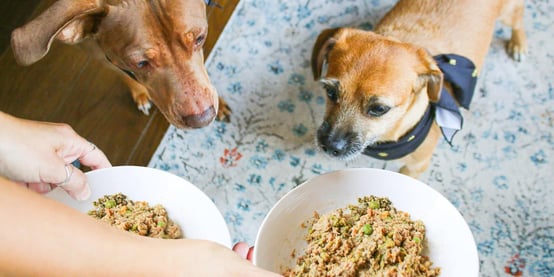If you are thinking about bringing a new puppy into your home, then this is a super exciting time in your life. Dogs are great companions, and dog ownership comes with numerous benefits. But, having a dog in the home means a lot of adjustments, and we want to make sure that you are prepared with the tips below.
1. Invest in Good Equipment
Once you get your puppy home, you will be very glad that you’ve taken the time to get the appropriate equipment for your pet.
Some crucial items are:
- dog crate (ideally with a divider so they can grow into it)
- dog bed
- good quality dog food and treats
- food and water bowls
- collar and leash
- enzymatic cleaner for accidents
- brush
- nail trimmers
- toothbrush and toothpaste
Here are some other playful gift ideas for your new pup!
2. Read Up on Training Books
Books are a great way to learn about dog behaviour. They will also help you know what to expect when to bring your dog home and get a jump start on training from the first day. Some of my favourite puppy books are:
- Perfect Puppy in 7 days: Dr. Sophia Yin
- Decoding Your Dog: American College of Veterinary Behaviorists
- Puppy Start Right: Kenneth and Debbie Martin
3. Invest in Pet Insurance
Pet insurance is the best way to protect your pet’s future health. The goal of investing in pet insurance is to ease the financial burden placed on you as a pet owner. Pet care can be expensive, but pet insurance helps protect you from new and unexpected veterinary costs, while giving you the confidence to choose the best care possible for your pet. Get a free Furkin Pet Insurance quote in seconds.
4. Research Your Breed and Breeder
Choosing the right breed for your lifestyle is the biggest decision that you can make. Many people will pick a breed based on prior pets, and others will choose a breed based on appearances. But, matching the breed of dog to your lifestyle is the most important factor we should be considering. If you work long hours and live in an apartment, an active herding dog shouldn’t be your top choice. Likewise, if you are very athletic and love to hike, a smoosh-faced breed (think Pugs, French Bulldogs, English Bulldogs, Pekingese, etc), shouldn’t be on your shortlist. The huge variety of dog breeds means that there’s a right breed of dog for every need!
Adoption from a local shelter is a great option, as they will have already temperament tested the puppy to check for personality and early behaviour issues. If you are interested in getting a puppy from a breeder, you need to do your research. It’s recommended to start with the CKC Breeder page. When speaking with the breeder, you want to make sure that you are able to meet the parents and that they are screened for genetic conditions (such as hip or elbow dysplasia). A great guide on choosing a breeder is available here.
5. Create a Daily Routine
Puppies absolutely thrive on routines, so coming up with your plan before your puppy arrives can be a big step in the right direction. Knowing what time we’ll wake up, eat, walk, and go to bed can go a long way in creating predictability in your puppy’s life. This also tends to make house training more successful.
Bonus: Here are some tips for communicating with your pet!
6. Have a House Training Plan
House training is typically the biggest training hurdle that needs to be tackled. Having a plan can set you up for success. Knowing if you are going to use a crate, use pee-pads, and where the puppy is going to sleep are decisions you will want to make before the puppy comes home. Remember, puppies will need to go outside very frequently, and you will want to reward them with a high-value treat as soon as they eliminate.
7. Set up an Appointment with Your Vet ASAP
You will want to schedule an appointment with your veterinarian within 48 hours of obtaining your new puppy. They will be able to examine your pet and make sure there are no signs of congenital or infectious disease. Your veterinarian will discuss a vaccination plan, options for spaying or neutering, perform fecal testing to assess for intestinal parasites, and start heartworm, flea, and tick prevention. They will be able to answer any questions you have about feeding, house training, trainer recommendations, and frequency of future vet visits.
8. Puppy Proof Your Home
Puppies can and will get into everything, so we want to make sure your home is as safe as possible. Baby gates are extremely helpful in barricading areas you don’t want your puppy to access. You will also want to make sure any houseplants are out of reach; you may also want to check if they are potentially toxic. Electrical cords are also a potential hazard for your puppy.
9. Enroll in Puppy Classes
Puppy classes are probably the most important investment you can make in your dog's life at this stage. The socialization period of dogs is considered to be 3-14 weeks of age, so we want to start these classes as soon as possible. Puppy socialization classes can be started after their first vaccines from your veterinarian, which is typically at 9 weeks of age.
Puppy socialization is about exposing your puppy to a variety of new things. The world can be a scary place for puppies — different people, animals, sounds, things, textures to walk on, etc. If not properly socialized, puppies are at risk of becoming fearful and anxious adults.
Even before you get your new puppy into their first class, you can be exposing them to things safely and in a positive way. The easiest way to make sure an experience is positive? Food!
You should focus on praising your puppy for appropriate behaviours, especially around new and potentially scary experiences. Giving a high-value food reward for wanted behaviours is so much more informative to your puppy than punishing behaviours you don’t like. Especially because punishment comes with a big risk: it will increase fear and anxiety, can increase the chance of aggression, and damage your relationship with your puppy.
When choosing a trainer for your puppy’s classes, follow these guidelines from BCSPCA.
10. Choose a Good Quality Food
There are so many choices out there when it comes to dog food — it can be so overwhelming! The best thing to do is to speak with your veterinarian about the right dog food for your puppy before purchasing. This will help cut down the chances of your new puppy having issues eating or not eating at all.
Some key points in selecting dog food:
- Needs to be grain-including (grain-free foods have been linked to heart disease)
- AAFCO certification, ideally with a feeding trial
- Should be labelled for growth since puppies have higher requirements for dietary protein, amino acids, and omega-3 fatty acids for brain health
- For more information, the World Small Animal Veterinary Association Global Nutrition Committee has put together a guide on selecting pet foods.

.png?width=2400&height=800&name=FINAL%20-%20Puppy%20-%20Large%20Text%20(1).png)


